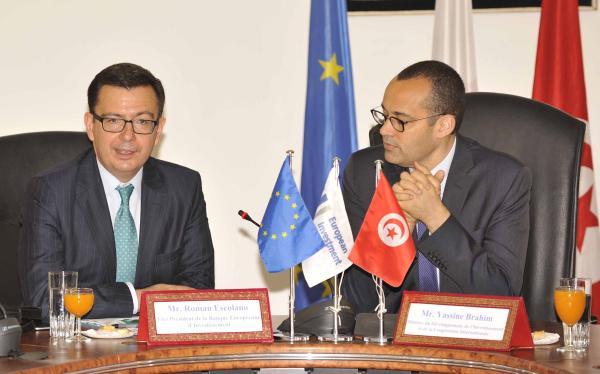
During the official visit of its Vice-President Mr Roman Escolano, the European Investment Bank (EIB) signed a loan contract with Groupe Chimique Tunisien (GCT) for EUR 19 million (42 million Tunisian dinars - TND) to reduce the environmental impact of GCT's production activities. This additional loan follows on from an initial EUR 55 million contract signed in 2008 for the same environmental upgrading project. The contract was signed on Thursday 26 May 2016 at the Ministry of Development, Investment and International Cooperation in the presence of H.E. Yassine Brahim, Minister of Development, Investment and International Cooperation, and EIB Vice-President Mr Roman Escolano.
"This loan is of symbolic importance for climate action", remarked EIB Vice-President Mr Roman Escolano. "The reduction of greenhouse gases is one of our priorities. That is why we have mobilised our resources, skills and expertise to support this project that will have a direct impact on sustainable development and on the daily lives of Tunisians. "
This large-scale financing operation will contribute specifically to the environmental upgrading of several of GCT's major facilities in order to reduce emissions into the atmosphere and liquid effluents and improve the management of solid waste. The environmental upgrading programme will focus primarily on the Skhira and M’dhilla production sites and, to a lesser degree, on the Gabès site, the main objectives being to: (i) reduce sulphur dioxide, ammonia and dust emissions into the atmosphere in accordance with current environmental standards; (ii) stop hydrofluoric emissions into the sea from the Skhira plant; (iii) develop controlled dumps for phosphogypsum waste; and (iv) set up an environmental monitoring system for all the production sites.
This project is also receiving EUR 10 million of support from the European Commission.
As the leading international development financier in Tunisia, the EIB has mobilised substantial resources to meet the expectations expressed by the Tunisian people as best it can and thus support the transition of Tunisia Since the democratic uprising in January 2011, the EIB has therefore invested EUR 1.5 billion (TND 3.3 billion) in the implementation of new projects in key sectors of the Tunisian economy such as energy, private sector support, infrastructure, education and social housing.

Photographer: EIB ©To be defined
Download original

Photographer: EIB ©To be defined
Download original

Photographer: EIB ©To be defined
Download original